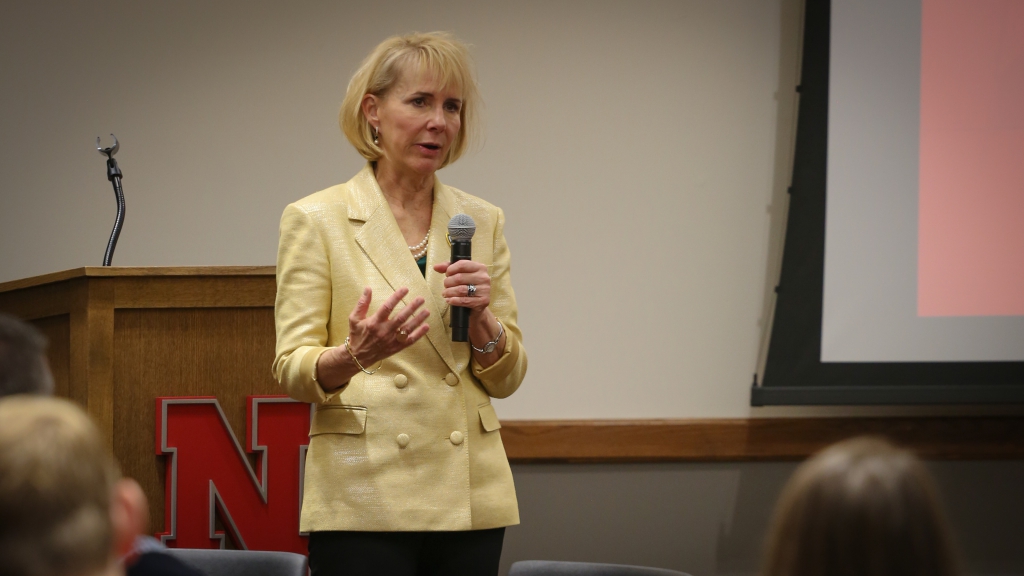Tiffany Lee, November 26, 2024
Espy offers wisdom on successfully navigating career challenges facing women
Kimberly Andrews Espy knows firsthand the challenges women face in the STEM fields.
Espy, president of Wayne State University in Detroit, Michigan, still recalls how it felt when, as a brand-new faculty member in neuropsychology, a male department head asked her an unexpected question.
“He asked me, ‘Who’s at home taking care of your children?’” Espy said. “At the time, I felt like he had just taken a knife and stabbed me. I don’t think he was intending to denigrate how I could contribute to the department, my research and its benefit to the state. But that’s certainly how it felt.”
Espy shared the anecdote with about 80 attendees at the Nov. 13 Association for Women in Science lunch at the Nebraska East Union. The event – part of the Office of Research and Innovation’s weeklong Nebraska Research Days celebration – served as a homecoming for Espy, an internationally recognized pediatric psychology researcher who was associate vice chancellor for research at the University of Nebraska-Lincoln from 2005 to 2011.
During that tenure, Espy was an early leader in recognizing the need to increase the number of women in the science and engineering departments. In 2008, she helped Nebraska secure a $3.8 million grant from the National Science Foundation’s ADVANCE program, which enabled the university to recruit, promote and retain female faculty in the STEM fields.
At that time, women made up less than 20% of faculty in the STEM disciplines at UNL. Today, that number has nearly doubled.
This type of success at the institutional level – paired with Espy’s individual success as a faculty researcher and her role as a mother of seven – made her a natural fit for keynote speaker at the AWIS lunch. In 2017, Nebraska established an institutional membership with AWIS, the country’s leading organization aimed at increasing the participation and impact of women in STEM.
Membership provides the Husker research community access to resources and professional development and network opportunities that support women in STEM.
At the lunch, Espy led a nearly hour-long question-and-answer session that touched on a range of issues affecting women in STEM, from fostering feeling voiceless on committees to fostering mentor relationships to the tenure and promotion process.
She emphasized that many times, unintentionally sexist remarks – like questions about child care – are opportunities to shine a light on the attitudes that can hamper the progress of women in STEM. Espy said there are ways to subtly point out the undercurrents of a question or comment – and then redirect the conversation to the topic at hand.
“Being female, the standards of what is considered acceptable is challenging,” Espy said of dealing with sexism in a professional setting. “But you can also use these moments to your advantage – to call out your idea or contribution – then advance the conversation forward.”
She also spoke about the value of seeking mentorship from a diverse range of individuals.
“I don’t think it’s wise to limit the sense of mentorship just to those who have walked a similar path,” Espy said. “Think of it as developing an ecosystem of support and networking rather than just a single mentor.”
To make the promotion and tenure process more equitable, Espy suggested that developing a dynamic mindset that focuses on work quality, rather than quantity, is key. One high-quality publication that took more time to produce is sometimes just as valuable as multiple lower-impact publications.
“We need to take a big-picture view related to what actually matters: impact on a field,” Espy said. “I think we’ve strayed a little bit sometimes from the actual purpose of promotion and tenure.”
She also answered questions related to the transition from a faculty appointment to an administrative role, the evolving field of research administration and her strategies for professional growth.
For the Office of Research and Innovation, Espy’s visit to Nebraska helped bridge past and future. While at Nebraska, Espy worked closely with former vice chancellor Prem Paul on many interdisciplinary research projects that left a lasting mark on campus, including oversight of the campus-wide research initiative that grew into the Center for Brain, Biology and Behavior; coordination of multiple federal grant applications that resulted in major facility renovations and new construction; development of the Research Development Fellows Program; and improvement of research compliance administration processes.
Espy also served as a postdoctoral mentor to Jennifer Nelson – who recently took the reins as interim vice chancellor for research and innovation.
Espy said her experiences at UNL were pivotal to propelling her success in university administration. After Nebraska, she went on to serve in leadership roles at the University of Texas at San Antonio, the University of Arizona and the University of Oregon.
“Many of the lessons I have taken with me started in Nebraska,” Espy said. “This is a really special place.”
Association for Women in Science Kimberly Andrews Espy Nebraska Research Days






